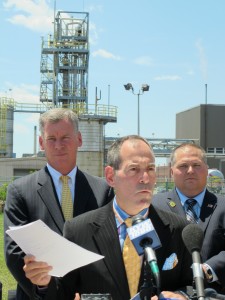DEP Secretary Michael Krancer Clarifies Views on Climate Change
-
Marie Cusick

Susan Phillips / WHYY
DEP Secretary Michael Krancer speaks about transforming shuttered oil refineries to shale gas processing plants in Delaware County.
Department of Environmental Protection Secretary Michael Krancer went before the House and Senate appropriations committees this week to discuss his agency’s budget, but he soon found himself pressed on the issue of climate change.
At a House Appropriations Committee hearing on Wednesday, Rep. Greg Vitali (D- Delaware County) pointedly asked Krancer whether or not he agreed with this statement from a National Academy of Sciences report:
Climate change is occurring, is caused largely by human activities, and poses significant risks for–and in many cases is already affecting–a broad range of human and natural systems.
Krancer seemed reluctant to agree.
“It is a compound statement,” he said, “I’d have to study it and look at it myself.”
Later on in the hearing, Rep. Matt Bradford (D- Montgomery County) brought it up again.
“Climate change. Is it real?”
“Representative, I couldn’t be more clear,” Krancer replied, “the lowering of greenhouse gases and carbon emissions is a good thing.”
“You couldn’t be more opaque!” shouted Bradford.
After he spoke at Thursday’s Senate budget hearing, Krancer explained his position to StateImpact Pennsylvania.
“[Scientists have] concluded that the world is getting warmer,” he said, “They’ve also concluded that human activity contributes greenhouse gas and carbon emissions to the atmosphere. I agree with that.”
But he went on to express a sense of uncertainty.
“There is no uniformity within the scientific community on how much the warming is occurring,” said Krancer, “And there’s no agreement about how much is attributable to the human part of it and how much is attributable to other factors.”
But actually, there is wide agreement in the scientific community.
The most widely cited and broadest scientific consensus comes from a 2007 report by the Intergovernmental Panel on Climate Change (IPCC) which found:
Most of the observed increase in global average temperatures since the mid-20th century is very likely due to the observed increase in anthropogenic greenhouse gas concentrations
Bob Henson is a meteorologist at the National Center for Atmospheric Research who writes about climate change. He says the uncertainty in the scientific community comes from what the future holds.
But assuming a doubling of carbon emissions (which we are on track for) climate models predict the globe will warm somewhere between 3 and 8 degrees Fahrenheit by the end of this century.
“It’s not yet clear how quickly the climate will warm,” says Henson, “Both ends of the range are substantial warming by late century.”
















